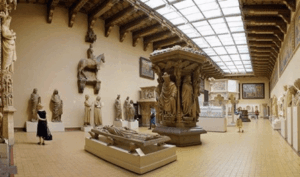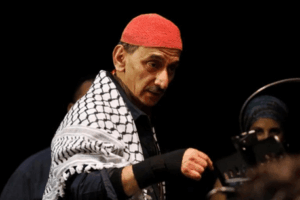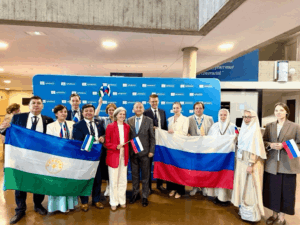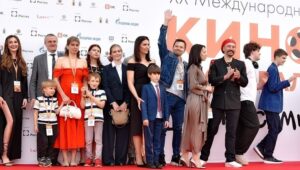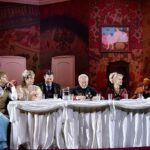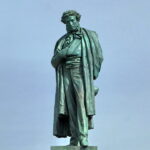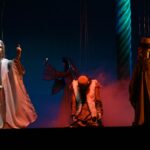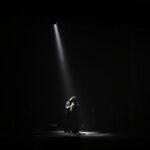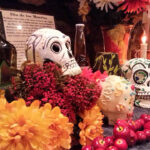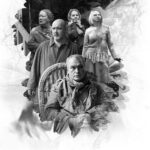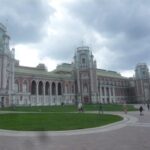Mstislav Rostropovich Week has come to an end in Moscow. The opening of the IX International Mstislav Rostropovich Festival was traditionally timed to coincide with the great cellist's birthday on March 27.
This year the first organizers of the Festival were the Government of Moscow, the Department of Culture of Moscow and the Rostropovich Foundation for Cultural and Humanitarian Programs, established by Mstislav Rostropovich himself in 1997, ten years before his death, as the Foundation for the Support of Young Musicians.
"Music is healing. Music lights the torch of goodness and can reorganize everything, improve the world," the cellist asserted.
Mstislav Leopoldovich was a great public figure. He was the first in the USSR to initiate music festivals: it was his idea to organize the First Festival of Contemporary Music in Gorky (now Nizhny Novgorod) in 1962.
Mstislav Leopoldovich won his first competition victory at the age of 18 at the Third All-Union Competition of Performing Musicians in Moscow, winning the gold medal. This success allowed the second-year student of the Moscow Conservatoire to move straight into the fifth year.
At the First World Festival of Youth and Students in Prague in 1947, Rostropovich also took first place, and the newspaper Mlada Fronta called him "the sensation of the competition". Surprisingly, it was winning the competition that caused him to give up composing his own music. Having first heard Dmitri Shostakovich's Eighth Symphony, which made a colossal impression on him, the musician decided to abandon thoughts of his compositional future, realizing that he would never reach the maestro's level anyway. Time has shown that Rostropovich made the right choice, and the world was presented with a unique and inimitable performer for whom music was written by some 60 of the greatest composers of the 20th century, including Dmitri Shostakovich, Sergei Prokofiev, Tikhon Khrennikov, Aram Khachaturian, Leonard Bernstein and many others.
As a chamber musician, Rostropovich performed in ensembles with such outstanding musicians as Leonid Kogan, Sviatoslav Richter, David Oistrakh, Emil Gilels, Isaac Stern, as well as with his wife - singer Galina Vishnevskaya as an accompanist-pianist, performing with her her immense vocal repertoire.
The renowned cellist made his debut as a conductor in 1968 at the Bolshoi Theater, where Tchaikovsky's Eugene Onegin was a resounding success. It was certainly a risk, because the play had been performed on the Bolshoi stage for 87 years and had been performed more than 2000 times. Mstislav Leopoldovich did a gigantic artistic work on the score - delving into all the details of the composer's remarks, he subordinated them to a single dramatic movement, in which the unhurried charm of the "lyrical scenes" and musical revelations emerged, where the orchestra was once again the main creator of the musical dramaturgy.
That was the Maestro. This is how he was recognized and remembered by the whole world.
But who knows about how the great musician, who zealously left no single musical phrase, not a single stroke and nuance unattended, was not afraid to speak out against the totalitarian regime, to defend his friends? After in the early 1970s he not only sheltered the famous writer Alexander Solzhenitsyn for four years in his house near Moscow in the village of Zhukovka, but also wrote an open letter to the main Soviet newspaper Pravda in his defense, the attitude of the authorities to him changed dramatically.
Galina Vishnevskaya recalled:
"The danger for the authorities was in the scale of the writer's talent, in the moral impact of "Ivan Denisovich" on readers. The image of the village Russian muzhik rose from the pages of the story generalized image of the people and, not letting go of himself, tormenting the mind and soul, appealed to the conscience of the people, to answer for the great atrocity and repentance".
Rostropovich, inviting Solzhenitsyn to live in his house in Zhukovka, said:
"Let anyone dare touch you in my house. I want you to have every opportunity to be creative."
Rostropovich believed that he was obliged to help the innocently suffering man. Solzhenitsyn rightly wrote later:
"My new friend, having offered me shelter on a broad-minded impulse, had not yet quite the experience to imagine what a blunt and long-lasting pressure would come upon him."
That's what happened. The authorities prevented him from performing with major orchestras and prevented him from touring abroad. The press began to ignore the cellist. In fact, he became a marginal and irreconcilable enemy of the Soviet state. In 1974 Rostropovich received an exit visa and went abroad with his wife and children for a long period of time, which was formalized as a business trip of the Ministry of Culture of the USSR. In 1978, the family was stripped of their Soviet citizenship.
The musician would later say:
"It is to her, Galina Vishnevskaya, her spiritual strength I owe the fact that we left the Soviet Union when I no longer had the strength left in me to fight, and I began to slowly fade, close to the tragic denouement ... Galina Vishnevskaya at this time with her determination saved me."
After the fall of communism and his return to democratic Russia, Rostropovich said in an interview that he considered that gesture in defense of Solzhenitsyn to be the best act of his life. His credo in life was independence from mundane conflict, the ability to detach himself from experience for the sake of a higher, all-consuming creative goal.
Thus Rostropovich became not only a consummate musician, but also a fighter for human rights.
Once, after a performance of Dmitri Shostakovich's Fifth Symphony at the Auditorium in Dijon (France), Mstislav Leopoldovich formulated something out of the ordinary:
"By performing music, I am defending human rights. The most important thing for me is to know that people are happy and free."
Mstislav Rostropovich has received several awards for his services to the defense of human rights, including the Annual Award of the International League for Human Rights. Mstislav Rostropovich has been a Global Citizen, UNESCO Goodwill Ambassador and honorary citizen of many cities around the world.
Despite his boundless public activities, the outstanding academic musician of the 20th century always remained a beloved husband and father. His daughters, Elena and Olga, also follow his life credo. Elena heads the Vishnevskaya-Rostropovich Medical Foundation, Olga heads the M.L. Rostropovich Foundation for Cultural and Humanitarian Programs. The Maestro devoted his entire life to the service of music, but even after his passing he continues to have a great influence on contemporary musical culture.
To celebrate the ninth year of the Festival in memory of the great cellist and conductor, citizen and public figure, the best musicians and orchestras of the world gathered together, delighting with an unexpected spectrum of genres and perfectly thought-out program of each concert.
Alina Sheshnyova
Preview image: fountain

